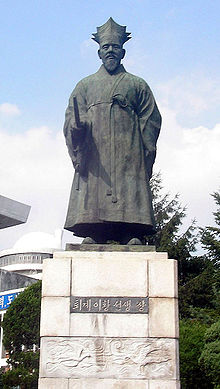
Back يى هوانج ARZ Yi Hwang Catalan I Hwang Czech Yi Hwang German Yi Hwang Spanish یی هوانگ Persian Yi Hwang French 李滉 GAN Yi Hwang ID Yi Hwang Italian
| Yi Hwang | |
 | |
| Korean name | |
|---|---|
| Hangul | 이황 |
| Hanja | 李滉 |
| Revised Romanization | I Hwang |
| McCune–Reischauer | I Hwang |
| Art name | |
| Hangul | 퇴계 |
| Hanja | 退溪 |
| Revised Romanization | Toegye |
| McCune–Reischauer | T'oegye |
| Courtesy name | |
| Hangul | 경호 |
| Hanja | 景浩 |
| Revised Romanization | Gyeongho |
| McCune–Reischauer | Kyŏngho |
| Posthumous name | |
| Hangul | 문순 |
| Hanja | 文純 |
| Revised Romanization | Munsun |
| McCune–Reischauer | Munsun |
Yi Hwang (Korean: 이황; Hanja: 李滉; 1501–1570) was a Korean philosopher, writer, and Confucian scholar of the Joseon period.[1] He is considered the most important philosopher of Korea - he is honored by printing his portrait on the 1000 South Korean won banknote, on the reverse of which one can see an image of his school, Dosan Seowon. He was of the Neo-Confucian literati, established the Yeongnam School and set up the Dosan Seowon, a private Confucian academy.[2]
Yi Hwang is often referred to by his art name Toegye ("Retreating Creek"). His courtesy name was Gyeongho.[3]
His interpretation of Neo-Confucianism was influential not only in Korea, but also in Japan, Taiwan, and Vietnam, and is now being studied even in the mainland China. His main work, Ten Diagrams on Sage Learning, originally published in classical Chinese language, has been already translated into modern Korean, Japanese, Vietnamese, English, French, German, Russian and Polish.
Some of his writings were looted by the Japanese military during the Japanese invasion of Korea.
- ^ Daehwan, Noh. "The Eclectic Development of Neo-Confucianism and Statecraft from the 18th to the 19th Century," Archived June 14, 2011, at the Wayback Machine Korea Journal. Winter 2003.
- ^ (in Korean) Yi Hwang at Doosan Encyclopedia
- ^ (in Korean) Yi Hwang Archived 2011-06-10 at the Wayback Machine at Encyclopedia of Korean Culture